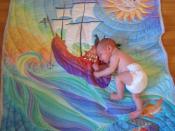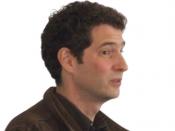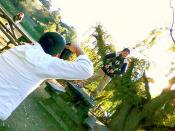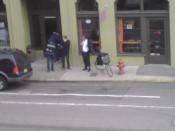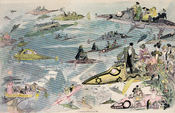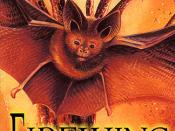"Dead Water Zone" A Science-Fiction NovelKenneth OppelÃÂs Dead Water Zone fits right into the genre of science fiction. In this novel a young boy named Paul leaves his orderly suburban home for a murky place called Watertown in search of his runaway brother, Sam who is very intelligent but frail. Strange events occur that leads Paul to believe there is something peculiar happening in the waters of this town that involves his missing brother. This novel consists of all the necessary elements that make up a science-fiction based novel. This story is set in the future, the consequences of scientific advancements are realized and the relationship between mankind and technology is explored in this novel.
The setting of this novel takes place in the near future where scientific principles are the basis of the story. A futuristic area of decaying docks and dilapidated buildings on the shore of a polluted lake forms the setting for this science-fiction novel.
The advanced scientific principles that are explored in this novel are the use of chemicals, radiation, bioengineering and microorganisms. The story takes place in the future when pollution is the most dominant factor of major cities and towns, Kenneth Oppel stresses this in his novel ÃÂPaul gazed down at the opaque green water swelling against the boatÃÂs side, the water was strewn with debris . . . timbers car tires, plastic canisters, oil slicked wooden spoolsÃÂ (Oppel 31). These points, including the advanced scientific principles, the cities overrun by pollution and the futuristic setting help prove that this novel is science-fiction based.
The consequences of scientific advancements are realized. The City introduces a pollution-eating microorganism into the lake in hope of cleaning up their contaminated city, but it mutates and the water is further contaminated. People who drink from the contaminated water begin to show unusual powers of strength and heightened senses but then the water proved to be toxic and deadly. The Consequences of this scientific advancement are that the water is strengthening and poisoning the residents. The residents then become hostile from the water which turn them into primitive dead-water addicts with a shorter lifespan. Sam discovers the mutated microorganism in the lake and he tests it on himself and was freed from his metabolic disorder but he gets addicted to it and then dies. Oppel states these consequences ÃÂThe water-drinkers changed, they got thin, sick and some died. They also got strong and fast but it was changing themÃÂ (86). These events that occur, mutations, shortened lives and hostile residents are evident as consequences of a scientific advancement.
MankindÃÂs relationship with science and technology is portrayed. The residents of Watertown test out bioengineering and create scientific templates. The city launched a clean up program and they discover uses for microorganisms and chemicals to rid the water of its pollution. People tried to use a series of chemical injections to extract the dead-water from their veins to cleanse them of their ailment. Some people were so inclined to test out new scientific upgrades that they created vile formulas as is stated throughout the story ÃÂThe Sturms had no idea where the dead-water came from, some drank too much; others made concoctions that killed them before they finished swallowing, most of the survivors went half crazy from itÃÂ (122). Mankind experiments with the dead water, bioengineering, chemicals and microorganisms thus displaying their relationship with science.
Kenneth Oppel incorporates all of the necessary elements and features of a science-fiction novel such as a futuristic setting, consequences of scientific advancements and peopleÃÂs relationship with science and technology. Throughout this story the reader is lead into suspicion from the rotting polluted environment, unusual characters, and mystery in this deserted town. By the end of the novel, family values are recognized as Paul finds Sam even though they donÃÂt stay together for long as Sam is left behind with a dead-water addiction. Kenneth Oppel is a famous author who won many awards for his other novels such as Airborne, Sunwing, Silverwing, and Firewing which sold over 900 000 copies worldwide and awards such as: Ruth Schwartz award, CIA book award and Mr. Christies book award.
Works CitedOppel, Kenneth, Dead Water Zone, Canada: Harper Trophy, 1992.
